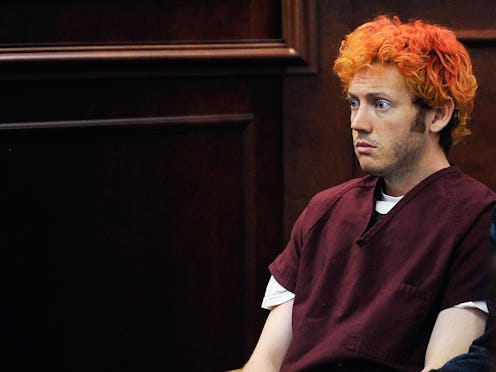News
What James Holmes' Diary Can Tell Us
Now in its fifth week, the mass murder trial of James Holmes is now delving into the Aurora shooter's mind. After pleading not guilty by reason of insanity, Holmes's mental state has come to play a vital role in the case and is the focus of both the defense's insanity argument and the prosecution's rebuttal. In an attempt to shed light on the inner workings of his mind, the jury was presented with Holmes's private notebook. The private scribblings, which were released to the public on Wednesday, include both evidence of his sanity, like meticulous plans for executing the shooting, and nonsensical ramblings that suggest the opposite.
Of the many findings in Holmes's notebook, which he titled "Of Life," perhaps the most damning one is his detailed plan for how to carry out the shooting. After ruling out serial murder and biological warfare, he settled on what he called a "mass murder/spree." He also ruled out attacking an airport because he didn't want to be labeled a terrorist. After deciding on a general mission, he went to work on the game plan, making lists of weapons he needed to buy, making detailed drawings of the theater interior, and even listing the pros and cons of attacking certain auditoriums.The notebook also revealed Holmes's "obsession to kill," which he wrote he's had "since I was a kid, with age became more and more realistic." And, according to testimony from Aurora police Detective Sgt. Matthew Fyles, Holmes also wrote that he needed to research the law and mental illness.
All of this points to someone who knew what they were doing and had the mental capacity to plan everything ahead of time and carry out his mission accordingly.
However, interspersed with these practical details are pages and pages of ramblings, which Holmes himself labeled "Insights into the mind of madness," that the defense could also use to support his insanity plea. These ramblings include questions like "Can a person have both no value AND be ultimately good AND/OR ultimately evil?" and "Why does the value of a person even matter?" There's also gibberish like "What is equal equal to?" and "All men are uncreated equal." Then there are the pages that are filled with the question "Why?" over and over again.
This aspect of the notebook does little to prove his mental stability at the time of the shooting. The defense has argued that Holmes was so addled by schizophrenia at the time that he no longer knew the difference between right and wrong, an assessment that's supported by a line in the notebook that says "the real me is fighting the biological me."
Regardless of how the notebook influences the verdict, which would decide whether or not Holmes gets the death penalty, it is a crucial piece of evidence and enlightening glimpse into the mind of a troubled individual — sane or not, troubled is indisputable.
Image: Getty Images
